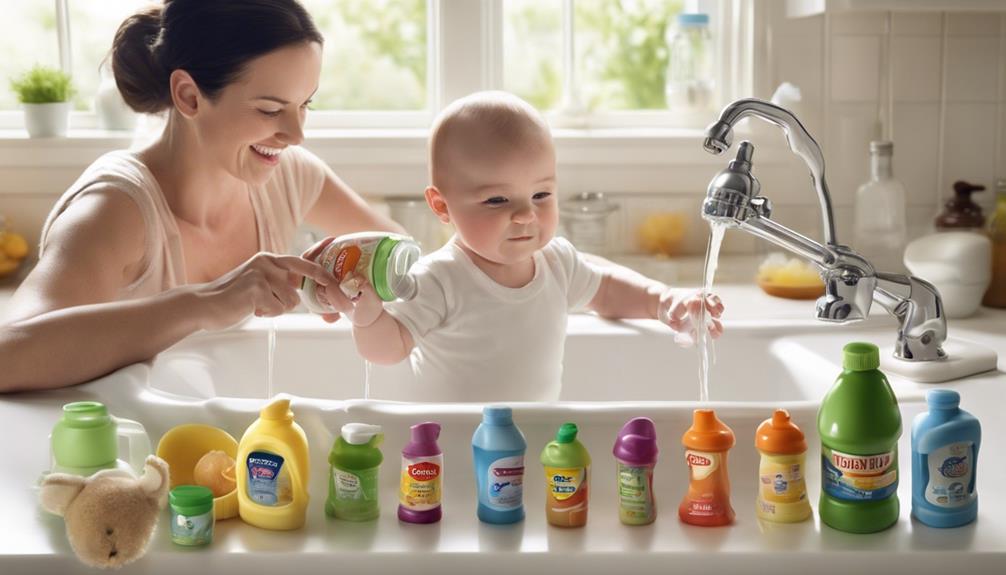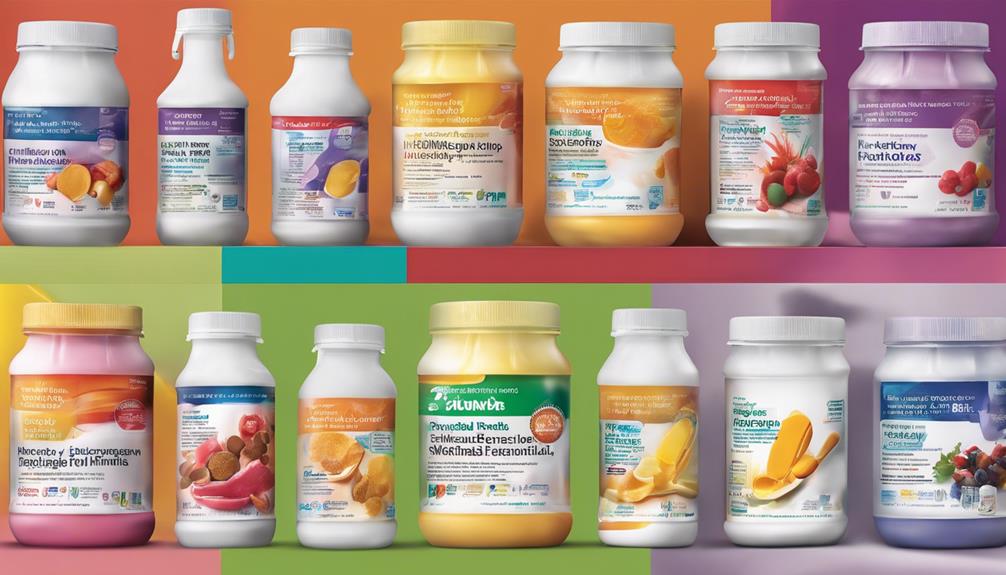Do you think you have mastered the art of bottle-feeding? When is the right time to transition away from using bottles?
Well, let's just say, the answer might surprise you.
There's a lot more to ponder than meets the eye when it comes to making this change, and knowing the right time can be vital.
Stay tuned to uncover the secrets behind when to say goodbye to formula feeding and hello to the next chapter in your baby's feeding journey.
Key Takeaways
- Transition to solid foods when showing interest, self-feeding skills, and decreased formula appetite.
- Introduce cow's milk alternatives cautiously, considering nutrients and baby's response.
- Wean off formula gradually, starting around 12 months with whole milk or toddler formula.
- Know when to stop milk for toddlers, ensuring a balanced diet with essential nutrients.
Signs to Stop Formula Feeding
If your baby is displaying signs of interest in solid foods and developing self-feeding skills, it may be time to think about stopping formula feeding. It's important to recognize when your baby is ready to shift off formula. Some clear signs include your baby starting to refuse formula or showing a decreased appetite for it. Additionally, as your baby begins to consume more solid foods and even drink water, these are indications that they might be ready to stop formula feeding. Observing your baby meeting developmental milestones such as improved coordination and self-feeding abilities can also signal that the time to shift off formula has arrived.
If you're unsure about the signs showing that your baby is ready to stop formula feeding, it's always wise to consult with a pediatrician. They can provide personalized guidance based on your baby's unique developmental stage and nutritional needs. Remember, every baby is different, so it's important to pay attention to your baby's cues and seek professional advice when needed.
Transitioning to Solid Foods

To successfully shift your baby to solid foods, it's important to introduce a variety of flavors alongside formula feeding to support their nutritional needs. When making the change, consider these key points:
- Start Slow: Begin with single-ingredient purees or mashed foods to ease your baby into the new textures.
- Offer Variety: Introduce a wide range of fruits, vegetables, grains, and proteins to diversify your baby's diet.
- Encourage Self-Feeding: Let your baby explore feeding themselves with safe finger foods to develop their coordination.
- Maintain Formula Intake: Make sure your baby is still receiving 22 to 32 ounces of formula daily to meet their nutritional requirements.
- Shift Gradually: As your baby becomes more adept at eating solid foods, gradually reduce formula feeds to start the weaning off process.
Introducing Cow's Milk Alternatives
As your baby explores new foods and textures, considering suitable cow's milk alternatives becomes important for their continued nutrition. Fortified, unsweetened soy milk is a recommended substitute for babies with lactose intolerance or milk allergies. However, consulting a healthcare provider before choosing an alternative is essential to guarantee it provides necessary protein and vitamins essential for your baby's growth and development.
When exploring plant-based options as alternative milks, it's vital to acknowledge that they may lack essential nutrients found in whole cow's milk. While rice milk and oat milk are popular choices, they may not offer the same level of nutritional benefits as dairy or soy milk. Hence, make sure the chosen alternative for cow's milk provides the necessary nutrients for your baby's well-being.
Weaning Off Formula Gradually

Gradually moving your baby off formula should be done thoughtfully and patiently to guarantee a smooth and comfortable adjustment to a new diet. Here are some key points to think about during this important change:
- Baby Starts Weaning Process: Typically, the weaning process begins between 4-6 months when solid foods are introduced alongside formula or breast milk.
- Whole Milk Change: Phase 2 of weaning usually starts around 12 months when the baby's digestive system is ready for whole milk or toddler formula.
- Consult Your Healthcare Provider: It's crucial to consult your healthcare provider before making any alterations to your baby's diet to make sure they're ready to start the shift from formula.
- Babies Can Start at 12 Months**: A gradual adjustment, starting no earlier than 12 months, is recommended for the baby's comfort during this process.
- Ensure Adequate Diet**: Make sure your baby has a substantial diet to comfortably go without formula once the change is complete.
Shifting from formula to whole milk is a significant step, and taking it slowly guarantees your baby's well-being and comfort throughout the process.
Knowing When to Stop Milk for Toddlers
Shifting your toddler from formula to whole milk is a significant milestone in their nutritional development. At around 12 months, it's time to contemplate making this shift to guarantee your toddler receives essential nutrients like fats, calcium, and vitamin D critical for their growth. Whole milk is recommended as babies' digestive systems are typically prepared for it at this stage. To facilitate the change, gradually decrease formula or breast milk while increasing whole milk to help toddlers adjust to the new beverage smoothly.
It's vital to consult your pediatrician during this process to make sure your toddler maintains a balanced diet during the shift. Your pediatrician can offer personalized guidance based on your child's specific needs and baby development stage. By seeking professional advice, you can support your toddler's nutritional requirements effectively as they move from formula feeding to whole milk, fostering healthy growth and development.
Frequently Asked Questions
When Should I Reduce Formula Feed?
We should gradually reduce formula feeding as solid foods are introduced, typically around 4 to 6 months. The change to solids becomes more significant by 6 months. It is crucial to continue formula alongside solids until at least the first birthday.
How Do You Transition From Formula to All Solids?
When moving from formula to all solids, we gradually exchange formula for solid foods, offer formula in a cup for familiarity, encourage self-feeding skills, and shift to a cup around 12 months. Take small steps to help your baby adjust comfortably to the change.
When Should I Stop Supplementing With Formula?
We should stop supplementing with formula around 12 months. At this age, babies can switch to whole milk and a balanced diet. Consulting our pediatrician before making this change is important to make sure our baby's nutritional needs are met.
How Long Do You Need to Formula Feed?
We usually formula feed until the baby is around 12 months old. It's important to consult with a pediatrician to decide when to shift to whole milk and solid foods. Every baby is different!
Conclusion
Well folks, it's time to bid farewell to formula feeding and embrace the world of cow's milk and solid foods. Remember, weaning off formula is a milestone in your baby's development, so take it slow and steady. Trust us, you'll know when it's time to make the change.
And hey, if your little one has specific dietary needs, there are plenty of alternatives out there.
Cheers to happy and healthy changes!









